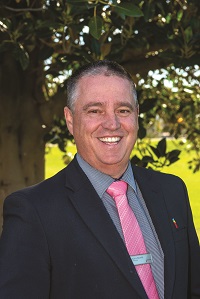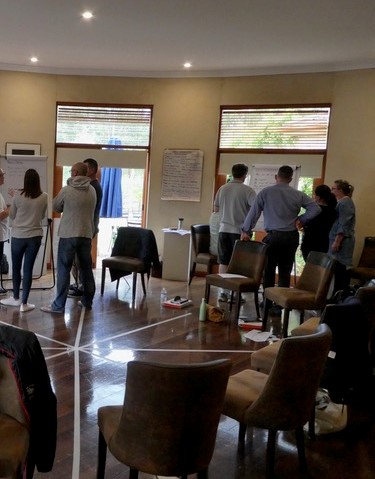
Singleton Council recently embarked on a program to energise its leadership culture and increase employee engagement in an initiative that was recognised at the Australian HR awards last December.

The challenge was to replace Council’s hierarchical, siloed way of doing things to one that reflected a collective, across-the-board approach.
General manager Jason Linnane says he had his come-to-Jesus moment when he walked into his first executive meeting to be confronted with a boardroom full of leaders waiting to be told what to do.
That culminated in his decision to engage a Sydney-based collective leadership consultancy and set about transforming the organisation.
Five years since that first meeting, overall employee engagement is up and more employees are reporting effective leadership and clear direction for the future.
Mr Linnane took out some time to chat Government News about the journey.
GN: What prompted the decision to change Council’s leadership culture?
JL: When I walked into my first meeting with the senior leadership team five years ago, I found an empty seat at the head of a boardroom table and sixteen managers waiting to be told what to do.
Staff engagement results were very low and turnover was very high.
I realised quickly that there was a massive opportunity for improvement at Singleton Council.
What wasn’t working?
For me, I’ve always believed that one person does not own all of the wisdom – it lives in the collective. I am committed to the principles of business excellence and leadership, people and systems thinking are three of the nine principles.
I wanted a team that could take a collective and systems thinking approach to leadership, and I wanted to move from management to leadership.
How did you go about initiating the changes and what were the benefits of engaging a consultant?

workshop. (Image supplied by Leadership Coefficient)
I gained agreement from the elected Council and the leadership team that we needed to move from the hierarchical and technical approach to a collective, people-focused one.
We agreed we needed to leave behind siloed thinking where each leader focused on their own patch and we agreed that the leadership team had a responsibility and accountability for organisational outcomes.
We made structural changes and brought in people leaders, people who would be a good cultural fit.
External expertise, support and guidance was essential for us. We found case studies of the work Leadership Coefficient had done around collective leadership and they resonated massively with me.
We “owned” the program but Leadership Coeffiecient played an important role in facilitation and holding us to account, and the group and individual coaching was incredibly valuable.
How much did you invest in the program financially?
As a per centage of total annual expenditure it’s miniscule – approximately 0.25 per cent. When you take into account the reduced turnover, massive increase in staff engagement, flatlined operational expenditure and improved achievement of all organisation key result measures, I would say it is very good value.
We undertook a formal procurement process and I am completely satisfied the benefits have, and continue to, far outweigh the costs.
What specific changes did you make?
So many. We reduced senior leadership roles by about a third. We re-wrote senior leadership role position descriptions to focus on people leadership. We recruited people leaders, and we let others go.
We developed a leadership capability framework, and we now complete regular leadership 360 reviews. We started to measure staff engagement on a frequent basis; we put in place works programs for every staff member; we developed a staff recognition scheme; we changed leadership meeting agendas, frequency, content and reporting. We implemented a staff well-being program.
There’s more but I think you get the gist!
What were the biggest challenges you faced?
Not a lot to be honest. The organisation seemed ready for a people-first approach, so it wasn’t a very hard “sell”.
Having to let people go was and is always hard. We had some people who were committed and technically strong but they weren’t people leaders.
Staying on course is hard as senior leaders naturally get caught up in their own operational issues which at times makes it hard to take that whole of organisation perspective. But they continue to do very well and are committed to our approach.
Have you seen any tangible benefits from the changes?
Absolutely. We’ve seen staff engagement go from 42 per cent in 2018 to 72.5 per cent in 2020.
There’s been a drop of around 15 per cent in staff turnover. Outside of structural change, we haven’t lost one senior leader since 2017 and only two or three from our co-ordinator group which numbers about 25.
We have turned operating deficits into three consecutive operating surpluses.
We’re also realising significant reduction in injury duration rates and injury/incident reporting, and last year we received two excellence awards at the Australian HR Awards (eds note: Singleton received Excellence Awards in the Best Change Management Strategy and Best Health and Wellbeing Program categories) .
How important will change management be for councils over the next 12 months, particularly in the wake of COVID?
I think change management is always very important. Local government is not immune to what’s going on around us. The world is always changing so we need to as well.
COVID has and will continue to impact on our industry. Managing the impact of change will be a key focus for all leaders.
What’s the message for other councils that might be looking at a new-year revamp of their leadership culture?
Success or otherwise rests with leadership. Ensure people in leadership roles are equipped to effectively lead, and be brave to embrace and empower the wisdom of the collective.
Comment below to have your say on this story.
If you have a news story or tip-off, get in touch at editorial@governmentnews.com.au.
Sign up to the Government News newsletter